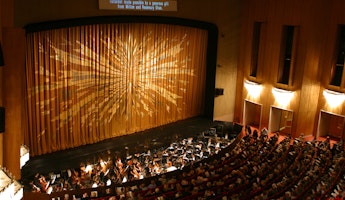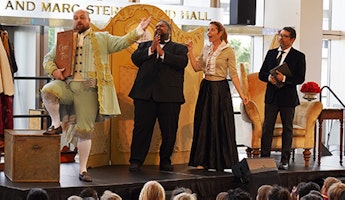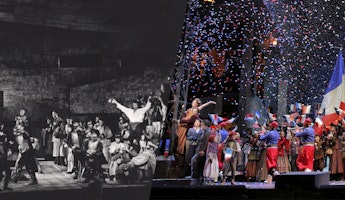Blog
August 7, 2023
From Page to Stage: "Don Giovanni"
Since its premiere in 1787, Mozart’s Don Giovanni has been hailed as one of the composer's masterpieces as well as cementing itself into opera history. With its ingenious score, twisted story, and haunting ending, it’s no wonder why we and fellow operagoers can’t get enough. The libertine we love to hate didn’t start as an opera, however. Over a century before Mozart ever wrote a note of music, the Don was terrorizing the theatrical world. Join us as we go over the history of Don Giovanni from the original 1630 play to Mozart’s masterpiece, to prepare for his grand return on our stage this upcoming season.
Starting off as a popular legend, the Don’s first written appearance was in the Spanish playwright Tirso de Molina’s play The Trickster of Seville and the Stone Guest, where he appeared under the name “Don Juan.” Though first published in 1630, it is believed to have been performed as early as 1616. (That’s 140 years before the birth of Mozart.)
Set in the 14th century, the play follows Don Juan, a womanizing and violent man who tries to seduce every woman that he sees. As he continues his seductions, more and more people try to catch him and put an end to his harmful behavior. Don Juan kills one of them, the father of a conquest, and the murdered man returns in the form of a stone statue and drags Don Juan to hell for his sins.
The story of Don Juan would be told and retold for centuries after de Molina’s play. But before we get to Mozart, there is another operatic version of the story that is important to know about. The Trickster of Seville and the Stone Guest received an earlier musical adaptation by Italian composer Giuseppe Gazzaniga with his 1787 opera Don Giovanni Tenorio. Gazzaniga’s librettist, Giovanni Bertati, Italianized the names (Don Juan now being Don Giovanni) and made some structural changes to de Molina’s play, setting the entire story in Villena, Spain. It’s a one-act opera, so the original play’s action had to be streamlined; still, Bertati’s opera begins with the seduction of Donna Anna and the killing of the Commendatore and ends with Don Giovanni being dragged into hell by the statue. Bertati’s version of the story would be the starting point for Mozart’s librettist Lorenzo Da Ponte, who then added elements back in from the original play that had previously been left out of Gazzaniga’s shorter opera.
Now the stage is set for Mozart’s Don Giovanni. As mentioned before, Mozart would work with librettist Lorenzo Da Ponte, who also wrote the librettos for The Marriage of Figaro and the not-yet-written Così fan tutte. The Mozart-Da Ponte operas all follow the opera buffa (comic opera) tradition of having the story take place in a single day. Mozart and Da Ponte would have less than a year to work on Don Giovanni as it was slated to premiere on October 14, 1787, at the Estates Theater in Prague for Archduchess Maria Theresa of Austria’s visit. Unfortunately, Don Giovanni was not ready by then, so The Marriage of Figaro performed in its place. Don Giovanni was finally completed on October 28, 1787, just one night before its premiere. Mozart conducted the premiere himself, which garnered thunderous applause and left audiences stunned, saying they’d never heard an opera like it before.
Mozart would revise the opera for its Vienna premiere on May 7, 1788. Two new arias would be added (as well as a duet for Leporello and Zerlina that’s typically cut). For those who love opera trivia, during the final scene of Don Giovanni, listen for an homage to “Non più andrai,” Figaro’s famous aria from The Marriage of Figaro, played by Don Giovanni’s band for his dinner party. Hearing it, Leporello scoffs: “I know this piece all too well.” (At both the Prague and Vienna premieres, the singers who played Leporello had previously sung Figaro in The Marriage of Figaro.)
Centuries after its premiere, Don Giovanni is considered to be one of the greatest operas of all time and is still taking audiences by storm. From stage drama to one-act opera to the three-hour Mozart masterpiece that we know now, the scandalous antihero has had quite the ride in terms of adaptations. This is without even mentioning the story’s countless non-operatic adaptations such as an epic 16,000-line poem Don Juan by Lord Byron (who died in 1824 before completing it) and Joseph Gordon-Levitt's 2013 romantic-comedy film Don Jon. Personally, we can’t wait to see Don Giovanni’s grand return to our stage on September 23, and hope to see you there.








/03-cosi/_dsc0996_pr.jpg?format=auto&fit=crop&w=345&h=200&auto=format)
















